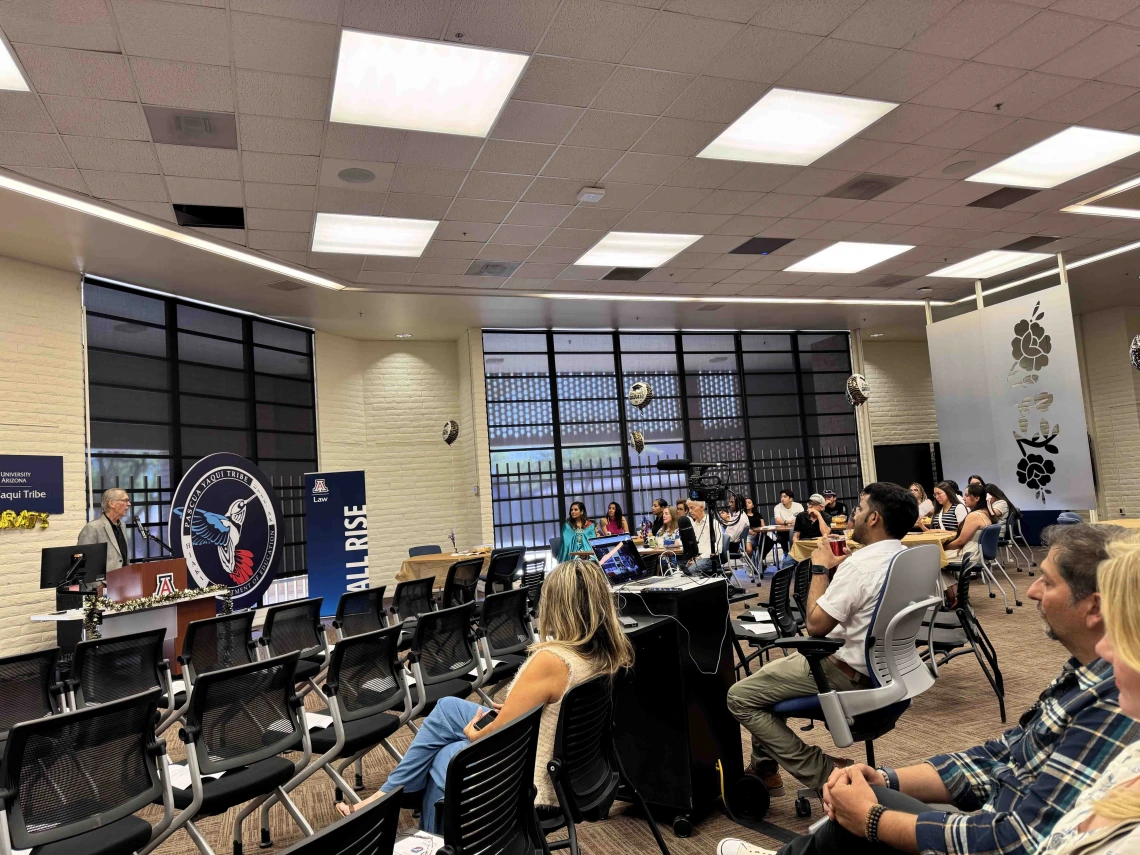Pascua Yaqui–UArizona Microcampus Celebrates Tribal Courts and Justice Administration Graduates

The Pascua Yaqui Tribe–University of Arizona (PYT-UA) Microcampus celebrated the achievements of students who completed the Professional Development Certificate in Tribal Courts and Justice Administration during a special graduation ceremony held on Friday, May 23, from 4:00 to 6:00 PM.
The event brought together graduates, tribal leaders, University of Arizona faculty, and community members for an afternoon of recognition, reflection, and celebration. The program began with a prayer ceremony and inspirational address by Dr. Augustine Romero, Ph.D., Director of the Pascua Yaqui Department of Education, who reminded students of their roles as leaders rooted in culture, service, and justice.
For those unable to attend in person, the ceremony was streamed live on YouTube, allowing family members, alumni, and community supporters to join the celebration from anywhere.
The program also featured a ribbon-cutting ceremony for the Microcampus’s newly developed Video Recording and Virtual Reality Studios, led by Professor Robert A. Williams, Jr., Regents Professor and Faculty Co-Chair of the Indigenous Peoples Law and Policy (IPLP) Program. These innovative spaces are part of the Tribal Digital Inclusion initiative, which expands access to culturally grounded, high-tech learning opportunities within the Pascua Yaqui community.
The certificate program—offered tuition-free to Pascua Yaqui Tribal members and employees, with scholarship support for others—is delivered in a fully-online format, allowing students to engage in legal and policy coursework while remaining connected to their community. Courses focus on Native American law and policy, family and domestic relations law, and tribal court systems, equipping students with the tools to serve as future tribal legal professionals and justice advocates.
Graduates received certificates in front of their peers, families, and tribal leaders. The event was attended by representatives from the National Telecommunications and Information Administration (NTIA) and University of Arizona leadership, who have supported the Microcampus’s efforts to bridge education and digital access through federally funded infrastructure and programming.
“This celebration marks more than academic achievement,” said Amir Hassibi, UA Main Library Services Professional and Technology Lending Supervisor, who has collaborated closely with the Microcampus team through the NTIA-funded Tribal Digital Inclusion initiative. “It represents a powerful step forward in building the legal and technological capacity of the Pascua Yaqui community—on their land, on their terms.”
"This program is a testament to the power of partnership, access, and community-rooted education," added Dr. Caleb Simmons, Executive Director of Online Education overseeing Arizona Online. "It affirms our shared commitment to supporting Indigenous sovereignty and creating meaningful educational opportunities in partnership with Native nations."
The event also honored the lasting contributions of Amy Pettifer, outgoing Microcampus Administrator. The Microcampus team presented her with a Leadership Award trophy and certificate, and the Pascua Yaqui Tribe community gifted her a culturally significant necklace in gratitude for her dedication and service. Colleagues and students offered heartfelt well-wishes as she embarks on her next chapter.
Guests toured several key learning spaces within the Microcampus, including the Judge Lawrence Huerta Student Learning Center, a dedicated computer lab that supports courses in Tribal Web Development, AI model-building, and digital literacy. Tours also included the new Recording Studio and Virtual Reality Lab, underscoring the Microcampus’s high-tech capabilities and commitment to accessible, culturally relevant education.
As the first Tribal Microcampus operated by a Land Grant University on tribal lands, the PYT-UA Microcampus continues to serve as a national model for Indigenous-centered education, digital inclusion, and tribal-university collaboration. The graduation ceremony not only marked the success of its students but celebrated a shared commitment to sovereignty, innovation, and community empowerment.

